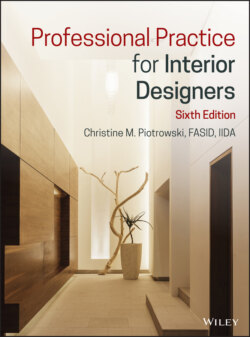Читать книгу Professional Practice for Interior Designers - Christine M. Piotrowski - Страница 111
Commercial Interior Design
ОглавлениеCommercial interior design—sometimes called contract interior design—involves the design and specification of public spaces, such as offices, hotels, hospitals, restaurants, and so on. It is normal for a commercial designer to focus his or her practice on only one area or perhaps on a few types of related public spaces. Depending on the size of the design firm, a firm might offer expertise in multiple specialties. Table 5‐4 is a partial list of the specialties that exist within commercial interior design.
An important skill for the commercial interior designer is to have knowledge and appreciation of the client's business. This knowledge helps the designer ask better questions about the needs and goals of the client during programming. The designer also realizes that clients are different even when they are in similar business categories. Therefore, the designer needs to understand the business of the business in order to make appropriate design decisions.
TABLE 5‐3. Partial list of residential interior design specialties
| Single‐family homes | Model homes and apartments |
| Townhouses | Dormitories |
| Condominiums | Sustainable design |
| Patio homes | Senior housing |
| Apartments | Apartments in assisted‐living facilities |
| Manufactured housing units | Color consultation |
| Vacation homes | Historical restoration/renovation |
| Residential restoration | Custom closets/storage |
| Kitchen and/or bathroom design | Residential children's spaces |
| Home offices | Renovation for the physically challenged |
| Home theater design | Private yachts and houseboats |
| Music rooms/game rooms | Home staging |
TABLE 5‐4. Partial list of commercial interior design specialties
| Almost any kind of commercial or business facility can become a specialty in interior design. Choosing too narrow a specialty, however, can limit the amount of business the interior designer will be able to obtain. |
| General offices |
| Facility planning |
| Corporate executive offices |
| LEED ® specialist |
| Professional offices |
| Law |
| Advertising/public relations |
| Accounting |
| Stockbrokers and investment brokers |
| Real estate and real estate development |
| Financial institutions: banks, credit unions, and trading centers |
| Architecture, engineering, and interior design |
| Consultants of various kinds |
| Health care |
| Hospitals and health maintenance group facilities |
| Medical specialty office suites |
| Nursing homes and assisted‐living facilities |
| Medical and dental office suites |
| Outpatient laboratories and radiological treatment facilities |
| Psychiatric facilities |
| Rehabilitation facilities |
| Medical laboratories |
| Veterinary clinics |
| Hospitality and recreation |
| Hotel, motels, and resorts |
| Restaurants, coffee shops, etc. |
| Commercial kitchens |
| Recreational facilities |
| Health clubs and spas |
| Country clubs |
| National and state park facilities |
| Amusement park facilities |
| Sports complexes |
| Auditoriums and theaters |
| Museums |
| Convention centers |
| Casinos |
| Set design: movies and television |
| Retail facilities/merchandising |
| Malls and shopping centers |
| Department stores |
| Specialized retail stores |
| Gift shops in hotels, airports, and other facilities |
| Store visual merchandising |
| Displays for trade shows |
| Showrooms |
| Galleries |
| Boutiques |
| Educational and institutional facilities |
| Colleges, universities, and community colleges |
| Secondary and elementary schools |
| Day‐care centers and nursery schools |
| Private schools |
| Churches and other religious facilities |
| Government offices (federal, state, and local) |
| Courthouses and courtrooms |
| Prisons |
| Industrial facilities |
| Corporate offices |
| Manufacturing facilities |
| Training facilities |
| Employee service areas, such as lunchrooms and fitness centers |
| Transportation |
| Airports, bus terminals, train depots, etc. |
| Tour ship design |
| Custom and commercial airplane interiors |
| Boats and ships |
| Recreational vehicles |
| Adaptive use |
| Restoration of historic commercial sites |
| Commercial products design |
It is also important to realize that the client who has contracted with the designer is often only one of the users/stakeholders that must be satisfied. The satisfaction of employees and the public or the clientele of the business directly affects the success of the design and future business. Not understanding and designing in relationship to this issue can result in a nice‐looking interior for an unhappy client.
